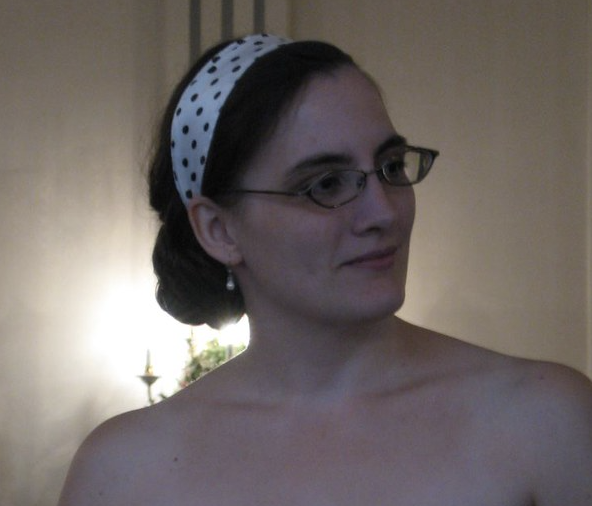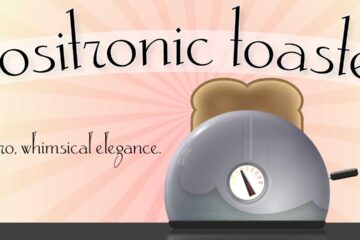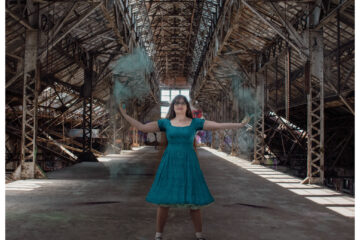I’m starting to wonder if my culture has turned a vice into a virtue.
We are inundated constantly by the industries that profit off of vanity. Imaginary new “problems” are invented for perfect people – do you have thigh gap? Are your teeth white enough? Are your eyebrows the right shape?
I feel like the last curmudgeon in the nation, shaking my cane to shout, “Looks don’t matter!” as looks-focused work is repackaged as “taking care of yourself” – as if abrading your wrinkles were as healthy as bathing. Self-harm rebranded as self-care.
Let me take a step back and explain what I mean. Can I even define the bar between “hygiene” and “vanity”?
I remember my older sister shortly after she converted (briefly) to Seventh Day Adventist telling me, “Did you know jewelry is vanity? I had to stop wearing all my necklaces.”
“What about your makeup?” I asked.
Her heavily lined eyes widened in shock. “Makeup isn’t vanity, it’s good grooming!”
Changing the color of your lips is grooming? We’ve raised the bar on ‘grooming’ to artificial levels. Or really … arbitrary levels. A group decides jewelry is vain but make-up is not. Maybe another allows jewelry but not make-up. (I definitely remember reading that exact set up in early modern articles on sin.) Another decides you have to cover your head, another that you have to leave your head uncovered…
Maybe all this vanity is actually Conformity under another name? How hard do you work to look like everyone else? To signal your socio-economic class is slightly higher?
It’s enforced like any other social norm. People feel unabashed posting “Shame on her” about some aging celebrity not covering up the signs of her age enough. As if vanity were not only accepted, but demanded. Required.
Fit in. It’s your duty to look good, like your face is your lawn and the homeowner’s association is on the warpath.
Lo, I have sinned
I never learned to polish my appearance, so it’s a little too easy for me to complain of other people doing so. I was told I was ugly, so plucking my eyebrows or learning to apply foundation seemed not worth the effort – why dress up ugliness? When I asked my mother how I looked, she berated me for vanity and said, “No one cares what you look like.” My dad said “It’s more important to be smart.” I was strongly parented toward not being vain.
Of course, I was still vain! I manifested my vanity in worrying about hiding my shape, my acne. I dabbed concealer on zits, tucked cotton balls into my bra, and once had to have the school nurse cut a cord off my waist which I had tied there to look more slender. (My physical discomfort had the teacher send me to the nurse.) I was underweight at the time, regularly going hungry, and you could see my ribs, but still I was dismayed that my straight sides didn’t dent in like a Barbie doll. I remember tying the rope painfully tight and then pulling a sweater on. I was impressed, pleased, my reflection was finally RIGHT. I finally looked like a piece of plastic rather than a normal, skinny child.
I lied to the nurse when she stared at me asking why I had that there. I said “It was for a game.” She snorted, “Some game,” and sent me back to class.
I knew at an early age both that I had to look like Barbie, and I had to be ashamed of trying to look like Barbie. That’s … well, neither of those are good things.
Is my dislike of “vanity” really just patriarchy smacking down women for doing what patriarchy demands of them?
The Modesty Problem
Let’s be real – some of our culture’s divorce with “vanity as sin” has merit. “Shame” and “modesty” are virtues of misogyny, and of policing sexuality.
Be pretty, because your only value is tied to your looks, but not too pretty or you’re “asking for it”.
Male vanity was code for “gay” and female vanity was code for “mean” — or, let’s be honest “has enough self-esteem to not put men first.”
In the traditional narrative, you had to not only be beautiful, but act like you weren’t. The “She’s so pretty but she doesn’t know” trope that is kinda garbage because it glamorizes negative self-worth. Men had to be handsome but not TOO handsome, walking a razor’s edge to avoid homophobic censure.
I don’t want that! We need to be free to be whatever we want to be, to be sexual beings, whatever that means to us individually.
Things I Don’t Want to be Considered Vain
Playing with clothing, playing with makeup, your appearance. Drag. Cosplay. The vintage dresses I swoosh about in.
Maybe it’s about causing no harm? Though some (wrong-headed) people react as though a fat body in a swimsuit harms them, as though seeing an older woman’s un-retouched skin harms them, as though drag harms them… ick. ugh.
What I want to be acceptable: Nonconformity.
We need an updated definition of Vanity.
What makes it a problem, if not ‘shame’ and ‘modesty’? Vanity as self-harm. Vanity as egotism. Narcism, but also obsessive pleasing of others. That drive to treat one’s own body as an ornament for others to enjoy.
Because there is a cost. Time spent worrying about one’s looks is time not spent worrying about one’s fundamental rights. Productive energy lost into an ever-deepening sinkhole as the inevitable creep of age is fought against.
Hell, time spent worrying about one’s looks is time not spent worrying about the planet or social justice or music and art. It’s time away from more permanent forms of self-expression.
Here’s an alarming story – researchers were trying to get girls interested in STEM. They found that if the women in their promotional materials were attractive, the girls were less interested in studying STEM fields – it’s so much work to be beautiful, and so much work to study … if they have to pick one they pick being beautiful.
There is nothing, absolutely nothing, more important than looks to an adolescent. They are judged on this, and only this, constantly, day-in, day-out. We have to fight against that current, not feed into it. We have to show them they are more than a pretty surface.
Vanity causes eating disorders. Insecurity. Social anxiety. Yet, we don’t seem to want to blame it. There are too many voices telling us “Don’t grow old gracefully! Fight it every step of the way and feel empowered in a doomed battle because we have expensive cream to sell you!”
I don’t know. Lookism is never going to go away – people who are better looking get treated better, and “good grooming” and other tools of vanity help with that. I know when I go to author events that it behooves me to look as well as I can so people like me and buy my books.
What does looking good even get you?
Why all this effort to be “attractive”? It’s not about sexuality and partnering. I’ve been happily married for twenty-some years! It’s more pervasive than that. If my neck sags, if my cheeks wrinkle, well, I fear I’ll be dismissed as another boring middle-aged woman in an industry saturated with middle-aged women. Who wants to read HER book when there are exciting YOUNG authors with perfect teeth? Skinnier authors, taller authors, authors with lustrous hair…
When I get too down on my “ruined looks” I have to remind myself that when I was in my 20s and quite pretty (photo included so you can judge for yourself) no one wanted to buy my books, either.

I remember being told, “Oh, Marie! You’re a young, attractive woman! You just have to go to conventions and be SEEN by these editors! They’ll fall over themselves to impress you by buying your stuff!”
That fable is inaccurate. Dangerously so. Not only are most editors in the industry middle-aged straight women, but it is a universal truth that people in power are never interested in exchanging anything for the attention of those without it. They can get that attention without paying a dime, and so they will, and the penniless actress on the casting couch does not get cast, and the penniless author picks up the drinks for the rich editor and leaves still unknown.
What I’m trying to say is that when we strive so hard for the power of “looks” we are striving for a power that is difficult, if not impossible, to wield to our own benefit. A power that is in the hands of those doing the looking, and a power that is always fleeting. It is the power of the most beautiful cookie – to be devoured first.
Where do we go from here?
I guess what I want is … permission not to care what one looks like? To just present yourself to the world with messy hair, crooked teeth, no makeup, and say, why yes, I did wake up like this. I want to just be in my body and not have to think how it looks to other people.
I mean, Dad was right … it’s better to be SMART.
I wish we admitted that this wasn’t a good part of our national character, or at the very least, stopped praising vanity as “Taking care of one’s self” and stopped shaming people, especially women, when they choose not to go beyond cleanliness in “self care.” Banish phrases like “She let herself go”. Avoid listacles of “10 celebrities caught not looking their best” and just … I don’t know. See what it’s like to spend a day not looking in any mirrors? See if you can make the next ten compliments you give people not be about their looks?
It says something that I have a hard time thinking of non-looks-based compliments.
But I do know that YOU, dear friend, have excellent taste in blogs and the fortitude to read to the end.


